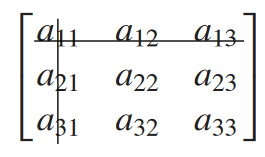If is some square matrix, the determinant of is some scalar associated with .
In MATLAB, we can use det(A), and in NumPy with np.linalg.det(A).
Expansion
We have a few different ways of evaluating determinants by hand. Probably the most important is Laplace expansion (or cofactor expansion). We can either expand down the columns:
or along the rows:
The gist of this is simple: to compute the determinant of , we usually examine the values of the first row and make our way right or the first column and make our way down. We take that value, multiply it by , then draw two lines to exclude that value’s row and column.

We then take the determinant of the sub-matrix contained by these lines, and continue value by value.
Properties
If and are square matrices, and :
If is invertible:
Some additional properties:
- A square matrix is invertible if and only if .
- For an upper or lower triangular matrix, the determinant is the product of the diagonal entries of the matrix.
- If and are similar, then .
- The determinant of an orthogonal matrix is either or .
We can also relate elementary row operations with determinants. Say is obtained from manipulating in some way.
- If we divide a row of by a scalar , then .
- If we swap a row, then .
- If we add a multiple of to another row, then .
and matrices
We end up having some nice properties of determinants of matrices. For some matrix , the determinant is the scalar .
Determinant and invertibility theorem
If is a matrix and invertible, then:
For matrices, if , then:
Recall from the cross product, that the magnitude is the area of a parallelogram spanned by the two vectors. We extend to , where the above is the formula for the volume of a parallelepiped.